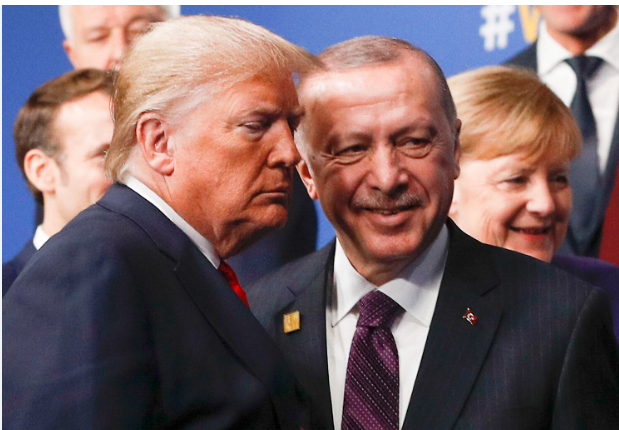While Turkish President Recep Tayyip Erdoğan has expressed a willingness to strengthen ties with Washington, Ankara’s foreign policy—particularly its engagement with BRICS, pro-Hamas stance, and continued ambivalence toward NATO—poses significant challenges.
Given the fraught nature of U.S.-Turkish bilateral relations over the last decade, spanning both the current Biden administration and the first Trump administration, the outcome of the 2024 U.S. elections presented Ankara with a dilemma.
The bones of contention between the two nations have been numerous: American concerns about the erosion of Turkish democracy, particularly restrictions imposed on freedom of speech; Turkey’s acquisition of the Russian-made S-400 air-defense system; the American recognition of the Armenian Genocide; Washington’s refusal to extradite Fethullah Gülen; U.S. support for the Kurdish PYD-YPG in northern Syria; Turkey’s initial opposition to Sweden and Finland joining NATO; Turkey’s membership in BRICS; and, most recently, Ankara’s unprecedented pro-Hamas stance.
With so many significant disagreements, it is difficult to envision a promising future for U.S.-Turkish relations.
U.S.-Turkish relations under the Biden-Harris administration
Before Joe Biden’s inauguration as president, his campaign openly challenged Turkey and its president, Recep Tayyip Erdoğan. In a letter sent to the Armenian National Committee of America (ANCA) on Sept. 16, 2019, Biden pledged to support the official recognition of the Armenian Genocide. Additionally, during a closed session in December 2019, Biden referred to Erdoğan as an “autocrat” and revealed his intention to support efforts to replace him with another leader through democratic elections. Unsurprisingly, these remarks provoked strong protests from Ankara. These events set the stage for a cold and contentious relationship.
Biden’s attitude towards Turkey remained unchanged after becoming president in January 2021. Consistent with his earlier statements, on April 24, Armenian Genocide Remembrance Day, Biden fulfilled his promise by officially recognizing the 1915 Armenian Genocide. The Biden-Harris administration’s critical stance toward Erdogan became even more evident when the White House excluded the Turkish president from the 2021 Summit for Democracy, indirectly criticizing Turkey for its deteriorating democracy and restrictions on freedom of speech. Biden also didn’t invite Erdoğan to the White House, nor did he plan a visit to Turkey during his term.
Turkey’s record on democracy and its foreign policy approach raised concerns in Washington. Adopting an “independent foreign policy doctrine,” first demonstrated during the 2010 U.N. Security Council vote on sanctions against Iran, Turkey voted against Western expectations and aligned itself with Tehran. Later, it circumvented sanctions through its state-owned Halkbank, an action that eventually became the subject of a lawsuit in U.S. courts.
Parallel to that stance, after the outbreak of the war in Ukraine, Ankara refrained from joining the sanctions regimeagainst Russia and once again pursued an “independent foreign policy.” While this turned Turkey into a hub for Russian flights and money, Ankara’s foreign policy cannot be labeled as pro-Russian. Erdoğan on numerous occasions stressed Turkey’s unequivocal support for Ukraine’s territorial integrity. In addition to verbal support, Turkey provided Bayraktar TB-2 UAVs to the Ukrainian army, and these drones inflicted considerable damage on Russian forces, particularly in the early stages of the war.
Turkey’s ambivalence was also evident within NATO. Although Turkey eventually approved membership for Finland and Sweden, it created obstacles throughout the admission process for these Scandinavian states. In retrospect, it is clear that Turkey leveraged NATO enlargement to circumvent the 2017 U.S. CAATSA sanctions against its military industry, triggered by Ankara’s acquisition of Russian-made S-400 anti-ballistic missiles. The acquisition placed Turkey in the category of “U.S. opponent”—a status that requires sanctions under U.S. law. On April 6, 2021, the sanctions were officially enacted. Three weeks later, on April 21, Turkey was officially removed from the F-35 program. As a result of these sanctions, Turkey not only lost the opportunity to acquire F-35s but was also prohibited from purchasing any American military technology, including F-16s.
Although Turkey publicly denied any linkage, Ankara effectively leveraged Sweden and Finland’s NATO admission to secure new F-16s as replacements for the F-35s. Finally, after Finland and Sweden’s admission to the alliance, and despite CAATSA, the United States approved the F-16 deal with Ankara on Jan. 27 of this year. Though the parties ultimately found common ground, the process underscored their mutual mistrust.
jns.org
